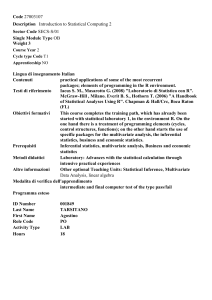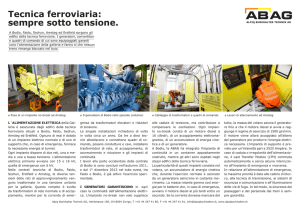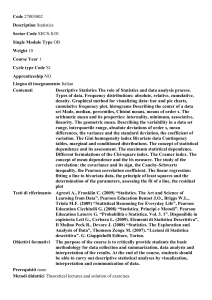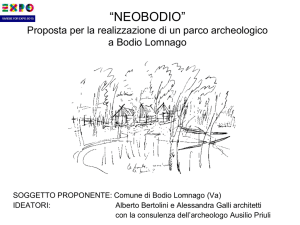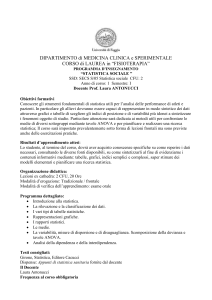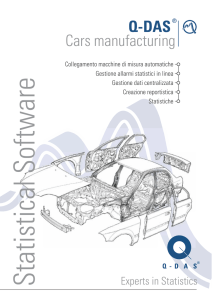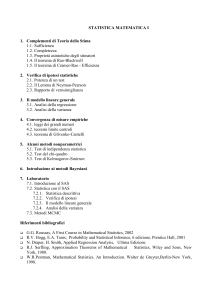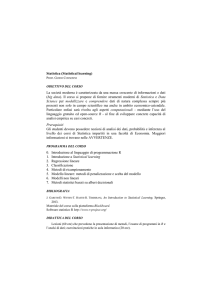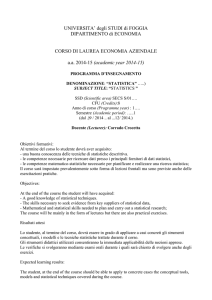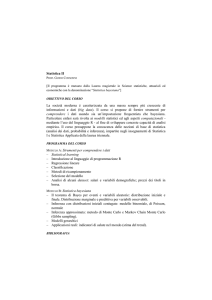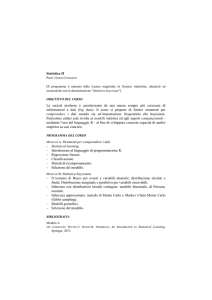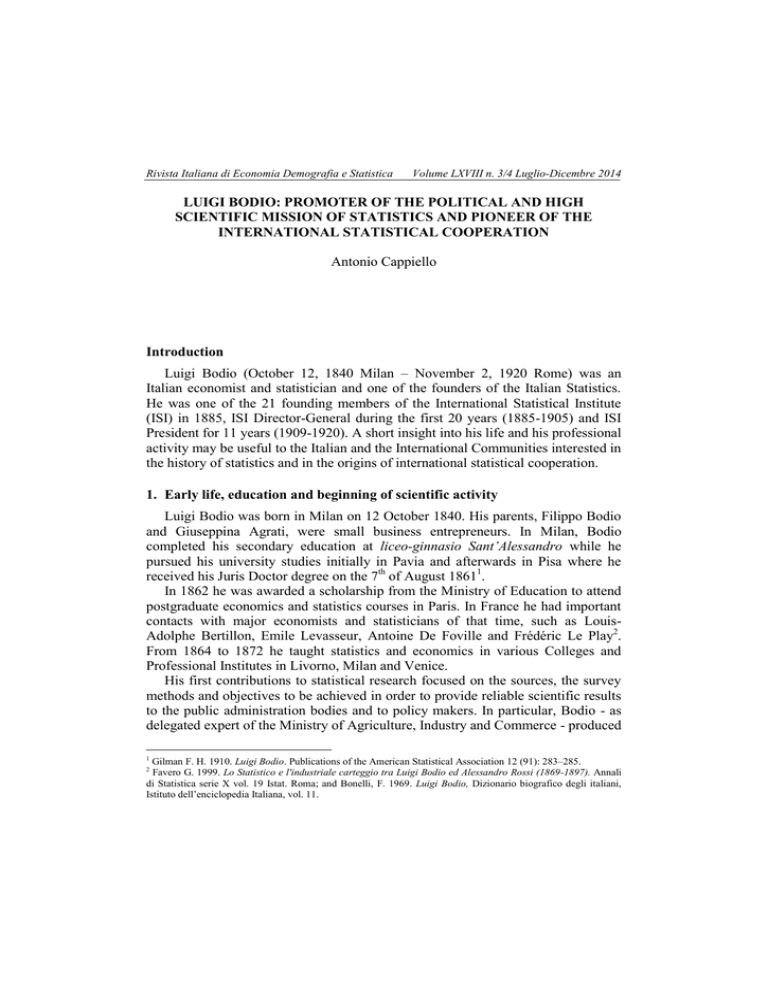
Rivista Italiana di Economia Demografia e Statistica
Volume LXVIII n. 3/4 Luglio-Dicembre 2014
LUIGI BODIO: PROMOTER OF THE POLITICAL AND HIGH
SCIENTIFIC MISSION OF STATISTICS AND PIONEER OF THE
INTERNATIONAL STATISTICAL COOPERATION
Antonio Cappiello
Introduction
Luigi Bodio (October 12, 1840 Milan – November 2, 1920 Rome) was an
Italian economist and statistician and one of the founders of the Italian Statistics.
He was one of the 21 founding members of the International Statistical Institute
(ISI) in 1885, ISI Director-General during the first 20 years (1885-1905) and ISI
President for 11 years (1909-1920). A short insight into his life and his professional
activity may be useful to the Italian and the International Communities interested in
the history of statistics and in the origins of international statistical cooperation.
1. Early life, education and beginning of scientific activity
Luigi Bodio was born in Milan on 12 October 1840. His parents, Filippo Bodio
and Giuseppina Agrati, were small business entrepreneurs. In Milan, Bodio
completed his secondary education at liceo-ginnasio Sant’Alessandro while he
pursued his university studies initially in Pavia and afterwards in Pisa where he
received his Juris Doctor degree on the 7th of August 18611.
In 1862 he was awarded a scholarship from the Ministry of Education to attend
postgraduate economics and statistics courses in Paris. In France he had important
contacts with major economists and statisticians of that time, such as LouisAdolphe Bertillon, Emile Levasseur, Antoine De Foville and Frédéric Le Play2.
From 1864 to 1872 he taught statistics and economics in various Colleges and
Professional Institutes in Livorno, Milan and Venice.
His first contributions to statistical research focused on the sources, the survey
methods and objectives to be achieved in order to provide reliable scientific results
to the public administration bodies and to policy makers. In particular, Bodio - as
delegated expert of the Ministry of Agriculture, Industry and Commerce - produced
1
Gilman F. H. 1910. Luigi Bodio. Publications of the American Statistical Association 12 (91): 283–285.
Favero G. 1999. Lo Statistico e l'industriale carteggio tra Luigi Bodio ed Alessandro Rossi (1869-1897). Annali
di Statistica serie X vol. 19 Istat. Roma; and Bonelli, F. 1969. Luigi Bodio, Dizionario biografico degli italiani,
Istituto dell’enciclopedia Italiana, vol. 11.
2
200
Volume LXVIII n. 3/4 Luglio-Dicembre 2014
an insight study (1865) on foreign trade statistics3 and on the sources of the Italian
statistical system with particular emphasis on the surveys carried out in the early
years of Italian Unification4. Luigi Bodio’s conception of statistics was grounded
on rigorous scientific observations. He considered “statistics” as a main auxiliary
science and as a basis for the political and economic disciplines which needed a
more experimental approach. Statistics was therefore an essential instrument for
measuring, not only pure economic and technical phenomena, but also social
phenomena including - for instance - moral aspects of the society5.
2. Evolution of the Italian Statistical System and Bodio’s role at a national
and international level
In 1872 the National “Giunta Consultiva di Statistica” (Consultancy Statistical
Committee) was replaced with the “Giunta Centrale di Statistica” (Central
Statistical Committee) governed by the Ministry of Agriculture, Industry and
Commerce and composed of the Head of the General Statistical Directorate, the
representatives of each Ministry and eight other representatives nominated in
accordance with the Royal Decree of 25 February 1872 n. 7086. Therefore, the
Central Statistical Committee became a “decisional body” as concerns statistical
data to be produced by the General Statistical Directorate, and a “consultancy
body” as concerns the policies of the Directorates of other Ministries. Thus, the
presence of the Ministry representatives inside the Central Statistical Committee
guaranteed an important connection among the activities of the various
Directorates of the Ministries.
The Royal Decree 29 September 1872 n. 1048 established the separation of the
Economic Directorate and the Central Statistical Directorate, the last one becoming
again an autonomous division under the direct management of the Ministry. On the
30th of June 1872 Luigi Bodio was nominated Director of the “Giunta Centrale di
Statistica” by Luzzatti (Ministry of Agriculture) and the 14th of November of the
same year was nominated Head of the General Statistical Directorate.
After a few years, under Bodio’s leadership, statistics methodology was
introduced as an academic topic (Royal Decree 11 October 1875 n. 2775) and
statistical courses were compulsory taught also in Law Universities. In1876 Bodio
was editor, together with Cesare Correnti and Paolo Boselli, of the Archivio di
3
Bodio L. 1865. Saggio sul commercio esterno terrestre e marittimo del Regno d'Italia negli anni 1862 e 1863.
Bodio L. 1867. Sui documenti statistici del Regno d'Italia. Cenni bibliografici presentati al VI Congresso
Internazionale di Statistica.
5
Bodio L. 1869. Della statistica nei suoi rapporti coll'economia politica e colle altre scienze affini. Prelezione al
corso di statistica della Scuola superiore di commercio in Venezia.
6
Antonucci E. 1937. I servizi centrali, in Istat, Decennale.
4
Rivista Italiana di Economia Demografia e Statistica
201
Statistica" (National Statistical Archive). In the same year, Luigi Bodio conducted
the first official surveys on Italian migration.
In 1885 he was founding member and Director of the International Statistical
Institute (ISI) and held that post until 1905. Bodio gained a solid international
reputation inside the scientific community, and his statistics methodology was
considered a reference for the major academics and policy makers. Paul Leroy
Beaulieu7 claimed: “Le statisticien qui a le plus complètement et méthodiquement
réunit les documents relatifs aux mouvements de la population dans les contrées
civilisées est M. Bodio le très savant chef de la statistique italienne; il les tient à
jour; c' est à ses tableaux qu' il faut se reporter”.
In 1900 Luigi Bodio was elected Senator of the Italian Kingdom and from 1901
to 1904 was General Commissioner of Migration (1901-04), an inter-ministerial
body created to address and protect Italian migration abroad. In 1909 he was
elected President of the International Statistical Institute and held that post until his
death in 1920.
Certainly Bodio gave an enormous prestige to Italian statistics,8 but his main
contribution was especially to “statistics beyond national and local borders”. This
was well recognized, also after Bodio’s death, by the international statistical
community. Friedrich Zahn, President of the International Statistical Institute from
1931 to 1936, said that Bodio “appartient avec Quetelet, Engel, Lavasseur,
Bertillon, von Ottingen, von Mayr, Wappäus, von Neumann-Spallart et autres à ce
noyau d’hommes de science et d’administration éminents, qui firent parvenir la
statistique à une âge d’or dans la seconde moitié du dix-neuvième siècle9”.
Bodio was convinced of the high political and scientific role of statistics. He
enriched Italian official statistics with new methodological concepts and improved
terminology, and obtained an important international reputation coordinating the
activities of the International Statistical Institute. Consequently, “statistics” became
a reputable “institution”10 in the Italian “state apparatus”, a discipline - as
previously said - taught in most universities and high schools11.
7
Revue des deux mondes, tome 143, 15 Octobre 1897, p.864.
Leti G. 2004. The International Activities of Italian Statisticians Prior to the Second World War. Statistica, anno
LXIV, n. 2.
9
Trad. : “Bodio belongs, together with Quetelet, Engel, Lavasseur, Bertillon, von Ottingen, von Mayr, Wappäus,
von Neumann-Spallart and others, to the new eminent experts of Science and Administration who conducted
statistics to a golden age in the second half of the XIX century”.
10
According to Bodio “statistics and economics should necessarily prepare and follow the legislation work”.
11
Patriarca S. 2003. Numbers and Nationhood. Cambridge University Press.
8
202
Volume LXVIII n. 3/4 Luglio-Dicembre 2014
3. Reorganization of official statistics in Italy and knowledge sharing with
leading economists and statisticians
The activities of the General Directorate of Statistics12 under the guidance of
Luigi Bodio, as before mentioned, represented a prosperous period for Italian
statistics that for many years was among the most advanced in Europe13.
Bodio gave to the Central and local Statistical Offices a very efficient
organization. He strengthened the power of the Central Office allowing it to make
use of all the State Administration Offices for collecting statistical information and
formulating appropriate guidelines on programs and methods of the State
Administration statistical procedures.
He also centralized the analysis of all national statistics at the General Statistical
Directorate (Central Statistical Office). Therefore the responsibilities of the
General Statistical Directorate were expanded and covered almost all the
economic, demographic, social and political fields.
Bodio’s efforts in building official statistics were directed toward the
recognition of the State Administration’s own role, independent from political
influences as veritable bureaucratic power. For this reason, Bodio promoted an
“interpretative prudence” which emphasised the technical role of statistics14.
Bodio’s personal international prestige gave continuity to the application of the
scientific methodology to Italian statistics.
From a practical point of view, in order to speed up the data analysis, Bodio
proposed to automate data processing by adopting classification machines based on
perforated files invented by Herman Hollerith and used in United States for the
census in 1890. In 1901 Bodio’s initiative allowed, for the first time in Italy, a
partial automation of data processing.
Luigi Bodio, as previously stated, made a great contribution to methodological
and applied statistics at the international level. He analysed issues concerning the
pure statistical methodology such as sample representativeness proposed by Kiær15,
as well as applied statistics. As concerns applicative aspects of statistical data, he
dedicated particular attention to crime statistics, health statistics, educational
statistics and some specific aspects of migration, the natural movement of
12
National (Central) Statistical Office.
Evidence of Bodio’s scientific activity are also represented by the numerous scientific reports attached to the
official statistics of the Italian Kingdom (1872-1900), the proceedings of the Supreme Council of Statistics
(published in the Annali di Statistica), of the State Council, of the Commissioner for the emigration, and from the
private and official correspondence with politicians, statisticians and economists. We do not have exhaustive
references of his scientific work since most part of Bodio’s archive in the General Directorate of Statistics was
lost. Bodio’s private library was donated to the Bocconi University of Milan where is currently stored.
14
Favero G. 2006. I servizi statistici ufficiali in Italia dall’Unità alla Repubblica: strategie di organizzazione
interna e pertinenza dell’informazione prodotta. Ca’ Foscari di Venezia No. 02/NL/2006.
15
Anders Nicolai Kiær (1838–1919) was a Norwegian statistician who first proposed the method of the
representative sample in order to obtain information on a population.
13
Rivista Italiana di Economia Demografia e Statistica
203
population and the economic indexes. Luigi Bodio precisely defined some subcategories of the migration phenomena and focused on aspects such as periodic,
seasonal and temporary migration, and permanent migration (classifying the data
on the basis of the information concerning the migrants’ residence abroad16).
As a means of knowledge sharing about methodological and applied statistics,
Luigi Bodio often used handwritten letters, the most employed instrument of
communication of that period. Bodio’s letters to economists, statisticians,
intellectuals and politicians constitute a veritable treasure of wisdom composed of
scientific and political reflections and advice. For instance, the letters of his
correspondence with the economists Vilfredo Pareto and Edwin Robert Anderson
Seligman contain very valuable sources of knowledge of the economic and
political thought of that time.
In 1920 Luigi Bodio chaired the works of the International Statistical
Commission appointed by the Council of the League of Nations17. He died in
Rome on the 2nd of November 1920 at the age of 80 years.
In 1996, a Statistical Cooperation Association (named ICstat, International
Cooperation Center for Statistics “Luigi Bodio”) was dedicated to the memory of
Bodio in recognition of his dedication and promotion of the statistical cooperation.
The Association, based in Rome, promotes international cooperation in the field of
statistics, economics and law. ICstat coordinates technical assistance projects
financed by international institutions and is particularly involved in several
transition and developing countries. The association supports democratic
governance, crisis prevention and recovery, human rights application and
monitoring systems, post-conflict political elections and referendum. Moreover,
ICstat produces studies for scientific and policy purposes.
Acknowledgments
I would like to acknowledge the contribution to international statistical cooperation
given - following Bodio’s spirit - by Dr. Salvatore Favazza, Senior Statistician,
Officer at United Nations and former Director of ICstat, International Cooperation
Center for Statistics “Luigi Bodio”.
16
Ratti A. M. 1929. Italian Migration Movements, 1876 to 1926. International Migrations, Vol. II, edited by
Walter F. Willcox, 440- 470, New York.
17
Coats R. H. 1921. Report of the International Statistical Commission Appointed by the Council of the League of
Nations. Quarterly Publications of the American Statistical Association, Vol. 17, No. 133 (Mar.), pp. 635-638.
204
Volume LXVIII n. 3/4 Luglio-Dicembre 2014
References and further readings
ASCHIERI A. 1921. Luigi Bodio. Metron, I (21), n. 4, pp. 180-195.
BENINI R. 1925. Atti della Giunta Centrale di Statistica 11/1920. Annali di Statistica
Volume XI, n.5.
BONELLI F. 1969. Luigi Bodio. Dizionario biografico degli italiani, Istituto
dell’Enciclopedia Italiana, volume XI.
COATS R. H. 1921. Report of the International Statistical Commission appointed by the
Council of the League of Nations. Quarterly Publications ASA, Vol. XVII, n. 133.
FAVERO G. 1999. Lo Statistico e l'industriale carteggio tra Luigi Bodio e Alessandro
Rossi (1869-1897). Annali di Statistica serie X vol. XIX, Istat. Roma.
FAVERO G. 2006. I servizi statistici ufficiali in Italia dall’Unità alla Repubblica: strategie
di organizzazione interna e pertinenza dell’informazione prodotta. Nota di Lavoro del
Dipartimento di Scienze Economiche Università Ca’ Foscari di Venezia No. 02/NL/2006.
GILMAN F. H. 1910. Luigi Bodio. American Statistical Association, Volume XII, n. 91.
LETI G. 2004. The International Activities of Italian Statisticians Prior to the Second
World War. Statistica, anno LXIV, n. 2.
MAYOR DES PLANCHES E. 1921. Bollettino dell'Emigrazione. Nuova Antologia,
volume XX, n. 16
NIXON S. W. 1960. A history of ISI, 1885-1960. The Hague, pp. 15-31.
PATRIARCA S. 2003. Numbers and Nationhood. Cambridge University Press.
RATTI A. M. 1929. Italian Migration Movements, 1876 to 1926. International Migrations,
Vol. II, edited by Walter F. Willcox, pp. 440- 470, New York.
REVUE DES DEUX MONDES, Tome 143, LXVIIè année, 4è période, 15 Octobre 1897.
STRINGHER B. 1920. Rendiconti dell’Accademia Nazionale dei Lincei. Sess. 5, XXIX.
Rivista Italiana di Economia Demografia e Statistica
205
SUMMARY
Luigi Bodio: promoter of the political and high scientific mission of statistics
and pioneer of the international statistical cooperation
Luigi Bodio (1840-1920) was an Italian economist and statistician, considered one of the
founders of the Italian Statistics. He was one of the 21 founding members of the
International Statistical Institute (ISI) in 1885, ISI Director-General during the first 20
years (1885-1905) and ISI President for 11 years (1909-1920). This article gives a short
insight into Luigi Bodio’s life and may be useful to the Italian and the International
Communities interested in the history of statistics and in the origins of international
statistical cooperation.
______________________
Antonio CAPPIELLO, Senior Economist, [email protected]

